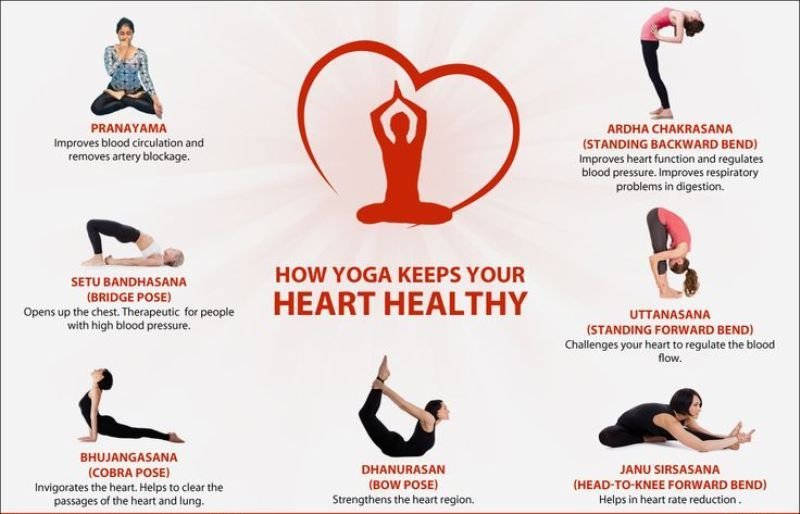Have you ever considered how your heart health is interconnected with your daily activities, stress levels, and even your breathing patterns? The choices you make influence your heart more than you may realize, and one practice that has gained immense popularity for its heart benefits is yoga.

Understanding Heart Health
Heart health refers to the overall well-being of your cardiovascular system, which comprises the heart and blood vessels. Your heart is vital, as it pumps blood throughout your body, supplying oxygen and nutrients. When discussing heart health, two main aspects come into play: physical fitness and emotional well-being.
The Importance of Cardiovascular Health
Cardiovascular disease (CVD) remains one of the leading causes of death globally. Conditions such as heart attacks, strokes, and high blood pressure can stem from poor lifestyle habits such as lack of exercise, unhealthy eating, and chronic stress. Understanding the factors that contribute to heart health is the first step to improving it.
Introducing Yoga: A Comprehensive Practice
Yoga is more than just a physical exercise. It combines physical postures, breathing exercises, and meditation, making it a holistic practice beneficial for both the body and mind. Although yoga may seem like a leisurely activity, scientific studies have proven that it can have potent effects on your heart health.
The Connection Between Yoga and Heart Health
Research indicates that engaging in regular yoga can lower blood pressure, reduce stress, and improve overall cardiovascular function. The blend of movement, breath control, and meditation helps promote relaxation and emotional balance, which indirectly supports heart health.
Benefits of Yoga for Heart Health Backed by Science
1. Reduced Blood Pressure
High blood pressure, or hypertension, is often referred to as the “silent killer” due to its lack of symptoms. Regular yoga practice has been shown to lower blood pressure significantly. A study published in the Journal of Clinical Hypertension reported that individuals practicing yoga experienced a marked decrease in both systolic and diastolic blood pressure.
2. Decreased Stress Levels
Chronic stress is a major contributor to various heart conditions. When you’re stressed, your body releases stress hormones that can elevate your heart rate and blood pressure. Yoga encourages mindfulness and relaxation, which can lead to stress reduction. The practice of deep breathing activates the parasympathetic nervous system, promoting a calm state.
Comparative Stress Reduction
| Practice | Average Stress Reduction |
|---|---|
| Yoga | 50% |
| Meditation | 45% |
| Deep Breathing | 40% |
| Aerobic Exercise | 30% |
3. Enhanced Circulation
Proper circulation is essential for heart health, as it ensures your cells receive the necessary oxygen and nutrients. One of the key benefits of yoga is its ability to improve circulation. The various postures encourage blood flow and help to make the blood vessels more flexible.
4. Improved Lipid Profiles
Regular yoga can positively influence your cholesterol levels. A study published in the European Journal of Preventive Cardiology found that yoga practitioners had lower LDL (bad cholesterol) and higher HDL (good cholesterol) levels. This positive change reduces the risk of heart disease.
5. Weight Management
Excess weight places added stress on your heart. While yoga may not burn calories at the same rate as some high-intensity workouts, it plays a significant role in promoting a healthy lifestyle and mindfulness regarding food choices. Engaging in yoga teaches body awareness, which can lead to better eating habits.
6. Increased Flexibility and Strength
Maintaining good muscle tone and flexibility is vital for overall health, including your heart. Many yoga poses help strengthen the core and lower body while improving your flexibility. As your body becomes more balanced, the cardiovascular system can work more efficiently.
7. Better Sleep
Sleep disturbances can negatively impact heart health. Many people experience insomnia or poor-quality sleep. Yoga can improve sleep quality through relaxation techniques, making it easier for you to unwind. According to a study published in the Journal of Clinical Psychology, yoga practitioners reported significantly better sleep quality.
Types of Yoga Beneficial for Heart Health
With numerous styles of yoga available, it’s important to choose those that cater to your heart health needs. Here are a few types to consider:
Hatha Yoga
Hatha yoga combines physical postures and breath control. It’s a gentle introduction to yoga that is suitable for beginners and promotes relaxation.
Vinyasa Yoga
Vinyasa involves flowing movements and breath synchronization. It can be vigorous but offers excellent cardiovascular benefits if practiced mindfully.
Restorative Yoga
This type of yoga focuses on relaxation and deep stretching, often incorporating props to support your body. It’s excellent for stress relief and recovery.
Yin Yoga
Yin yoga emphasizes long-held postures that encourage deep stretching. It promotes relaxation and can help lower stress levels, making it a great fit for heart health.

Incorporating Yoga into Your Routine
Setting Realistic Goals
As with any fitness routine, it’s important to set realistic goals. Decide how often you want to practice yoga. Whether it’s once a week or daily, the key is consistency.
Finding the Right Class or Instructor
Consider joining a local yoga class or following an online session. A qualified instructor can guide you properly and ensure you are practicing the postures safely.
Creating a Welcoming Space
Designate a specific area in your home for yoga practice. A comfortable space can help you mentally prepare for your sessions, allowing for a deeper connection to the practice.
Listening to Your Body
Yoga is all about tuning in to your body. If you feel any discomfort, adjust your posture or take a break. Remember, it’s about progress, not perfection.
Combining Yoga with Other Lifestyle Changes
Nutrition
In addition to yoga, maintaining a healthy diet is crucial for heart health. Aim for a balanced intake of fruits, vegetables, whole grains, lean proteins, and healthy fats.
| Food Group | Recommended Servings |
|---|---|
| Fruits | 2-4 servings |
| Vegetables | 3-5 servings |
| Whole Grains | 6-8 servings |
| Lean Proteins | 2-3 servings |
| Healthy Fats | 1-2 servings |
Physical Activity
Incorporate additional forms of exercise into your routine. Cardio workouts, such as walking, jogging, or swimming, further stimulate heart health when combined with yoga.
Mindfulness and Meditation
Many yoga practices integrate meditation techniques. Experiment with mindfulness and meditation outside of yoga sessions. These practices can further help manage stress, leading to better heart health.

Challenges You May Encounter
Time Constraints
Finding time for yoga practice may seem challenging amidst a busy schedule. Consider short sessions or integrating yoga stretches into your daily routine, like during breaks at work.
Stiffness or Discomfort
If you’re new to yoga, you might face stiffness or discomfort initially. Remember, it’s a gradual progression. Be patient with yourself and don’t force your body into challenging postures.
Motivation
Staying motivated can be difficult, especially if you’re practicing alone. Consider finding a yoga buddy or joining a community to provide support and encouragement.
Conclusion: Unlocking Heart Health Through Yoga
By now, it’s clear that yoga is a powerful tool in your quest for better heart health. The combination of physical postures, mental focus, and breathing exercises can lead to significant benefits, reducing blood pressure, stress, and cholesterol levels while improving circulation.
Remember, prioritizing yoga requires a commitment to your well-being. As you integrate this ancient practice into your modern life, you’re not only fostering a healthier heart but also nurturing your overall mind-body connection. Whether you’re a beginner or seasoned yogi, every little step counts on your heart health journey. Embrace the practice, enjoy the process, and watch your heart thank you for it!




